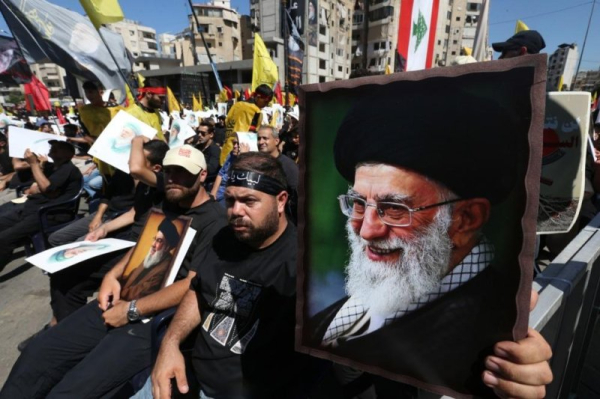

Supporters of Hezbollah carry pictures of Iran’s Supreme Leader, Ayatollah Ali Khamenei, as they watch a televised address by Hezbollah leader Sheikh Naim Qassem during Ashura Day celebrations in southern Beirut, Lebanon, on July 6.
Twelve people, including five Hezbollah fighters, were killed and eight others wounded Tuesday in Israeli strikes on the Bekaa Valley in eastern Lebanon, security sources and the official news agency reported.
Israeli warplanes carried out a series of strikes on areas near the city of Baalbeck in the northern Bekaa, sending thick plumes of black smoke into the sky.
The official Lebanese news agency reported that the strikes targeted Wadi Faara, where a camp for Syrian refugees was hit. The agency said 12 people, including seven Syrians, were killed and eight others injured.
Among the killed were five Hezbollah fighters, according to security reports.
Tuesday’s attack was the deadliest since the Nov. 27 truce accord ended 14 months of a devastating war between Israel and Hezbollah. Israel has kept on striking southern Lebanon and other Lebanese areas, including Beirut’s southern suburbs, since the cease-fire went into effect Feb. 18, killing more than 200 Hezbollah mid-level commanders and followers, as well as civilians.
Hezbollah denounced in a statement the “horrific massacre committed today by the Zionist enemy” in Wadi Faara, saying the air strike targeted “a water well drilling rig and claimed the lives of Lebanese and Syrian civilians.”
The Israeli English-language Ynet website confirmed the “unusually extensive wave of airstrikes” deep inside Lebanon and quoted an Israeli Army spokesman as saying that they targeted Hezbollah’s elite Radwan Forces in the Bekaa Valley.
The spokesman said the strikes focused on weapons depots and military camps used by Hezbollah for “conducting training and preparation of terrorists,” with the aim of blocking the group’s attempts to rebuild.
The Israeli Army said in a statement that the storage of weapons and Hezbollah’s activities at these sites “constitute a blatant violation of the understandings” between Israel and Lebanon and “a future threat” to Israel.
Israeli Defense Minister Israel Katz said that strikes were “a clear message to Hezbollah, which is plotting to rebuild Radwan Force’s raiding capabilities against Israel.”
Katz said it also was a message to the Lebanese government that Israel will “thwart any threat” and “will respond with maximum force” against any Hezbollah attempt to rebuild its capabilities.
In line with the cease-fire agreement brokered by the United States and France, the Lebanese Army has taken control of most of Hezbollah’s positions and military facilities, pushing the militant group away from the border with Israel and preventing it from having a military presence south of the Litani River.
Israel insists on fully disarming Hezbollah, which has refrained from retaliating to Israel’s continued aggressions and violations of the cease-fire accord.
In a separate development, Lebanon’s central bank has issued a directive prohibiting banks, financial institutions and investment entities from dealing directly or indirectly with a number of unlicensed and internationally sanctioned organizations, including Hezbollah’s financial institution, Al Qard al-Hassan.
Al Qard al-Hassan was founded in 1983 as a charitable organization, with the stated aim of providing interest-free loans and social financial services to the Shiite community in Lebanon, particularly in underserved areas. It is, however, not licensed by the central bank and functions outside the formal banking system.
The association, which has grown significantly over the years, has been sanctioned by the United States and other international bodies for allegedly supporting Hezbollah’s activities, including money laundering and terrorism financing. Hezbollah has denied the charges.
Despite international pressure, Al Ward al-Hassan continues to operate openly in Lebanon. In November, several of its branches were targeted by Israeli strikes as part of the war against Hezbollah.
The Central Bank’s directive, issued Monday, comes as part of Lebanon’s efforts to tighten financial controls and address international concerns over illicit financial activity. It was also an indication of Hezbollah’s reduced influence over state institutions since its devastating war with Israel.
According to the directive, the ban covers financial services, money transfers, leasing, lending and any activity that facilitates access to the Lebanese banking system in any currency.
It warned that “dealing with unlicensed and sanctioned entities exposes the licensed sector to significant legal and reputational risks.”
The decision was seen as a direct response to Lebanon’s inclusion on the Financial Action Task Force gray list of jurisdictions under increased monitoring.
The central Bank warned that entities violating the new directive will face harsh penalties, including suspension or withdrawal of their operating license, freezing of their accounts and assets, and referral to the Special Investigation Commission.
U.S. Special Envoy to Lebanon Thomas Barrack said the Central Bank’s decision was “a step in the right direction” by the Lebanese government in harnessing the flow of Hezbolah finances that had been directed through al-Qrad al-Hassan.
“Transparency and alignment of all financial intermediaries in Lebanon under the supervision of the Central Bank is a valued and necessary accomplishment,” Barrack said in a post on X.